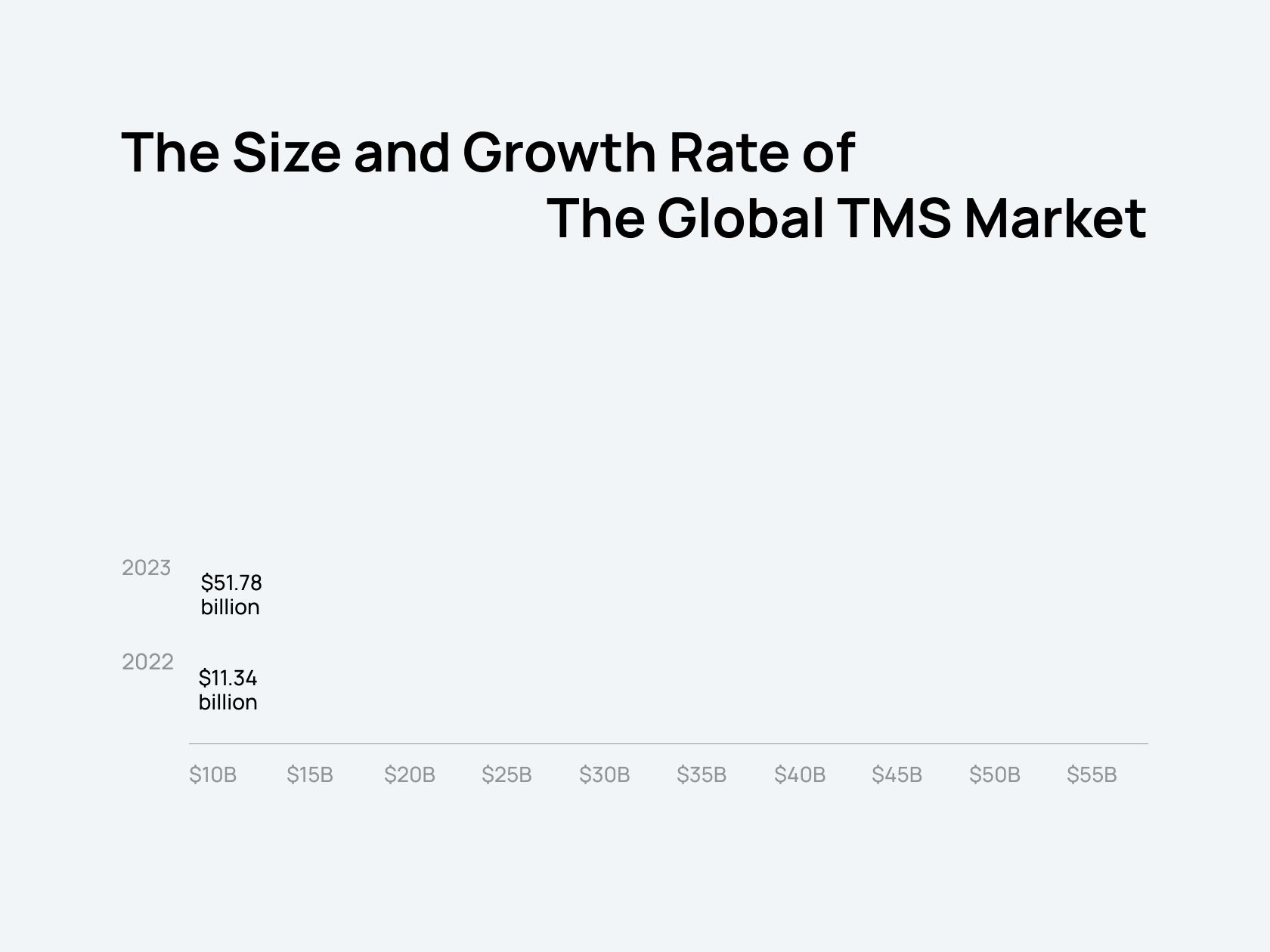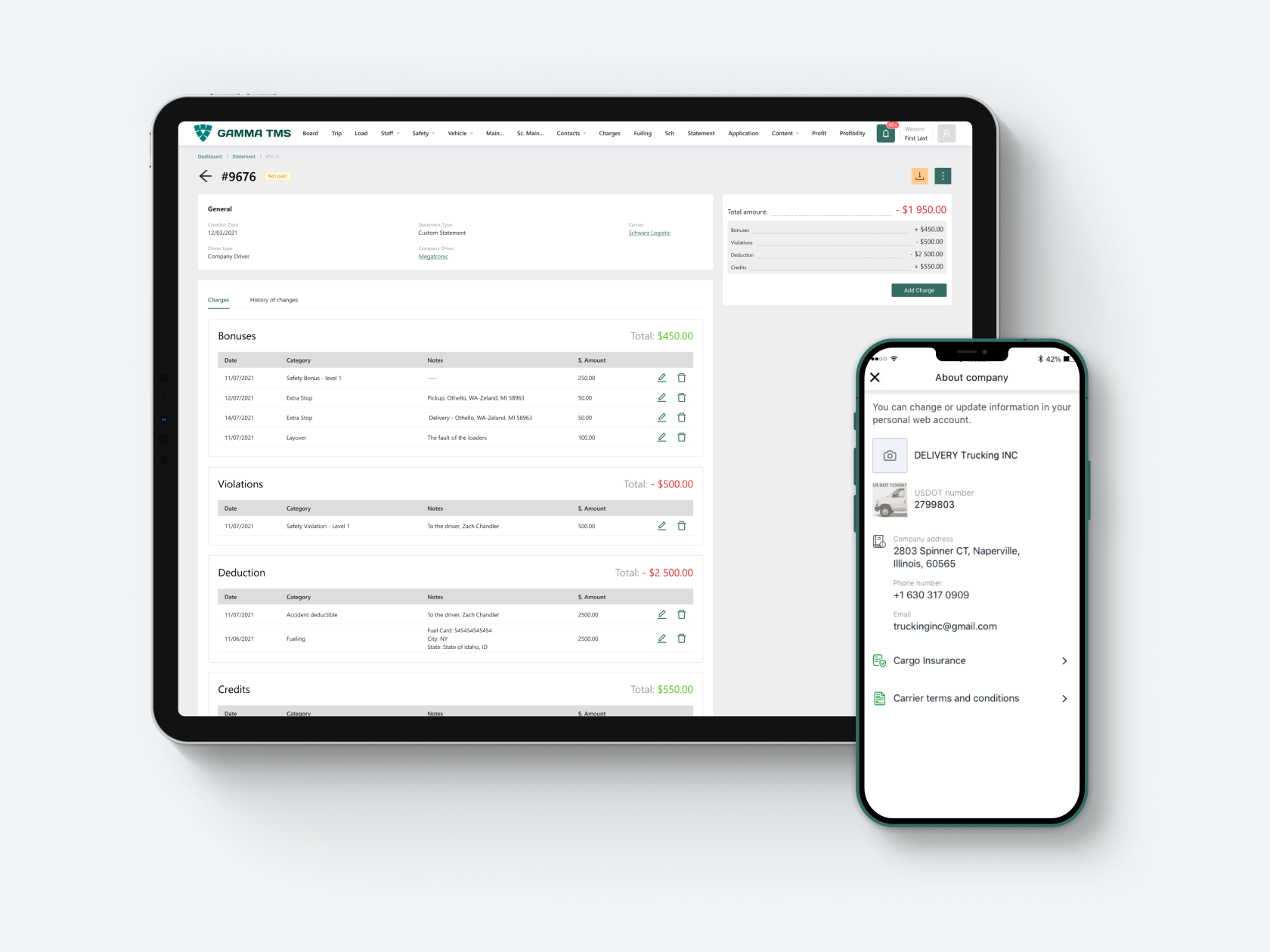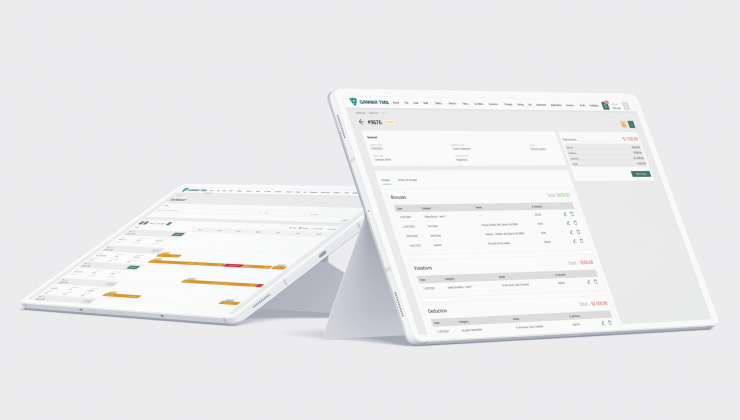Transportation companies often need highly-specialized software to automate cargo delivery planning and execution, control revenue and expenses associated with cargo transportation, and manage their own vehicles. That’s what TMSes do.
As for the transformation of such a type of software over time, its vendors gradually supplement it with advanced technologies and new functionality. Let's take a closer look at this aspect of TMSes existence.
Introduction to Transportation Management Systems (TMS)
Let’s start with learning the basic terms and related concepts related to TMS.
Transportation Management Systems or TMSes are software solutions designed to simplify and optimize transportation and logistics operations in supply chains. As part of a comprehensive logistics and transportation software development strategy, they typically include features such as cargo management, route optimization, load planning, cargo tracking, reporting, and so on.

In general, the impact of TMS on the logistics industry occurs along the six following directions:
- visibility and monitoring of transportation operations;
- audit and payment of cargo;
- documentation management;
- vehicle management;
- route scheduling;
- costs;
- analytics and reporting.
The Evolution of TMS: From Simple Tools to Comprehensive Systems
The evolution of transport management systems has led to a shift from simple task-oriented tools to complex systems covering a wide range of functions. However, we can single out some basic set of features that TMS have, regardless of their advancedness:
- order management;
- shipment rate management;
- load planning;
- fleet management;
- dock scheduling and yard operations;
- documentation management;
- connectivity portal.
Along with this, more innovative solutions can also include integrations with third-party solutions (CRM systems, geolocation APIs, etc.), support for mobile devices, smart analytics tools, and much more that can help companies cover all stages of cargo transportation from start to finish.
Exploring the TMS Market Landscape in 2022-2023
The Transportation Management Systems (TMS) market research report offers an extensive analysis of the existing market along with a forecast for the next five years, encompassing all primary segments and regions. With over 30 years of experience, ARC brings a deep understanding to this market analysis.
Now let's turn to statistics to get a complete picture of what is happening in the modern transportation management systems market.
The Size and Growth Rate of The Global TMS Market
So, how large is the TMS market? The independent web resource Spherical Insights claims that the global transportation management systems market in 2022 was $11.34 billion and promises to grow to $51.78 billion by 2032 at a compound annual growth rate (CAGR) of 16.4%.
Given such a positive trend, it becomes clear that the demand for such software will only grow, and the competition between transportation companies will become increasingly tough due to the boost in their stability through the introduction of such systems.

Key Drivers and Constraints of The TMS Market
Along with the obvious development of the capabilities of TMS systems, there are some drivers and limitations that their suppliers must reckon with.
In particular, the growing complexity of supply chains, the need to optimize costs and increase operational efficiency, the development of e-commerce and multi-channel retail (whose representatives are one of the main segments of the target audience for transportation companies), as well as the global focus to reduce non-renewable energy resources can be considered as the main drivers for the TMS market development.
As for constraints, we can include factors such as the high costs associated with the difficulties of implementing TMS, the emergence of difficult regulatory requirements in the transportation industry, as well as data security and confidentiality.
Impact of The COVID-19 Pandemic on The TMS Market
If we talk about restrictions that are difficult to predict in advance, one of these is the COVID-19 pandemic. This event significantly transformed the cargo transportation industry around the world in view of the emergence of new bans and the redevelopment of global logistics routes.
In addition, the pandemic has caused massive disruptions to global supply chains due to lockdowns and reduced transport capacity. In turn, TMS solutions have helped many companies overcome these disruptions by providing real-time visibility, alternative route planning, and inventory management capabilities.
TMS solutions also helped businesses to quickly adapt to the new changes in the structure of demand provoked by a sharp boom in e-commerce and a change in the product range.
And, of course, we cannot discount the sudden need for remote collaboration, increased automation of transportation processes, and the implementation of contactless operations that would be impossible without TMS solutions.
So, to stay afloat in these challenging times, many companies have been forced to adopt TMS and only have benefited from it.
The Value Proposition of TMS
Let's take a brief look at the value of TMS solutions for transportation companies in the next paragraphs.
The Role of TMS in Reducing Costs and Improving Efficiency
The main goals pursued by most transportation companies when implementing TMS systems are still to reduce overhead costs and increase the efficiency of work processes.
Indeed, thanks to the automation provided by TMS solutions, companies can scale their services without having to constantly increase their workforce. Automation also reduces the risks associated with the human factor and allows companies to minimize the time to perform daily business processes. Thus, all this provokes cost reduction.
Moreover, some TMS solutions are equipped with highly intelligent analytical tools that help companies to intelligently allocate their resources. Thus, cost savings come not only from speeding up processes and minimizing risks but also from effective planning.
Common Challenges in The Industry and How TMS Solves Them
If we talk about the most common problems that TMS software solves and that the vast majority of transport companies face, they include the following:
- use of mobile devices in work processes;
- optimization of fuel consumption;
- calculation of overhead costs;
- synchronization with third-party software;
- BOL (Bill of Lading) scanning, DOT inspection reports, and receipts.
By the way, one of our clients, a US-based cargo transportation provider, faced all these problems. We successfully solved them with the help of the custom Gamma product, which you can read about here:
The Benefits of Cloud-Based TMS Solutions
Since the problem of scaling TMS is still one of the most painful, more and more companies choose cloud-based TMS solutions. In addition to being scalable, they eliminate the upfront hardware investment and infrastructure maintenance costs associated with on-premises systems.
Equally important is the availability of such software: cloud-based TMS provides easy access to transport data and functions from any place where the internet connection is available.
On top of that, let's also focus on the security of such solutions: typically, their vendors use industry-standard security protocols, encryption, access control, and regular backups to ensure data integrity and protection.
Major Players in The TMS Market
It is time to find out which of the Transportation Management Systems (TMS) market players provide all the above business advantages.
So, who are the market leaders in TMS? Speaking of products that have collected the most positive user reviews on independent web platforms, we can highlight the following three:
- MyCarrierTMS, a one-stop solution for small and medium businesses;
- Cargobase, a product for midsize businesses and corporations;
- Descartes Aljex, a cloud solution for small and medium businesses.
Each of them, using certain tools, helps transportation companies to automate and optimize their delivery processes, reducing the number of manual operations.

Recent Developments and Innovations in TMS
You should be aware that many TMS systems with many years of history are based on their old platforms and are subjected to only minor updates from time to time. And, given the data from the global transportation management systems market analysis and the constant change in supply chain processes worldwide, the tools they provide may not be as efficient as the ones that have been created recently.
Is There An Ideal TMS?
There is no perfect TMS that will solve all the problems of every company that uses it. It is important to understand that one TMS is not enough to automate all business processes within a company – it must be a whole ecosystem of products that are interconnected.
If we are talking about near-ideal TMS solutions inspired by the latest trends in the transportation industry niche, it is worth mentioning such products as Lotex, RoseRocket, and AscendTMS.
User Adoption and Interaction with TMS
One of the major obstacles to the effective implementation of TMS solutions is their complexity. Let's find out how companies overcome it.
The Current Level of User Interaction with Digital TMS Solutions
Along with the abundance of functionality typical of modern TMS products, they still remain quite difficult to master for employees of transportation companies. Therefore, many companies have to spend resources on training their personnel.

The Role of Demonstrations, Trainings, and Educational Materials in Facilitating TMS Adoption
In general, demonstrations, educational materials, and trainings are aimed at lowering the entry threshold for employees of transportation companies. At the same time, many TMSes providers do not have enough training resources for their customers, and companies have to make extra efforts to train their employees to interact with this type of software.
Catering to Companies of Different Sizes in The TMS Market
What can be said about how suppliers of TMS products tailor them for businesses of different sizes?
If we are talking about small and medium businesses, one of the main factors in meeting their needs is the affordable cost of a TMS license and deployment. Such systems should also be fairly easy to use and not contain a bunch of redundant functionality. On the other hand, medium-sized businesses may need the scalability of such systems, and it can be quite difficult for TMS software vendors to strike the right balance between cost efficiency and access to new functionality.
As for large companies, TMS solutions aimed at this segment should have enterprise-level functionality and performance, an extensive list of integrations with third-party solutions, and also provide companies with opportunities to enter the international market (in particular, through compliance with regional regulations, multilingual and multi-currency support, as well as integration with global carriers and logistics partners).
How TMS Providers Adapt Their Solutions to Cater to Different Company Sizes
To make the product adaptable to businesses of different sizes, TMS vendors typically choose one of the following options:
- develop several separate variations of a complex solution, equipping each of them with both basic functionality and characteristics that a business of a specific scale needs;
- form the basic "backbone" of the product, which is purchased by default, and which can be supplemented with various modules that meet different business tasks;
- provide a product with redundant functionality that can satisfy the needs of a business of any size.
Note that none of these options is universal for the target audience of this software, so often, transportation companies at a certain stage of their development have to think about creating a custom solution.
Case Studies of Successful TMS Implementation in Companies of Different Sizes
If you want to consider particular cases of successful implementation of TMS software in companies of different sizes, we recommend checking the following ones:
- Gamma, a custom TMS to automate and synchronize business processes of the trucking company’s departments
- EasyLoad, a complex SaaS TMS solution for logistics business
The Future of The TMS Market
What is expected in the TMS software market in the near future?
If we conduct TMS market research, we will see that machine learning and artificial intelligence, blockchain, cloud services, SaaS architecture, as well as integration with IoT systems are the leading trends. However, the first two ones deserve special attention. Let's take a closer look at them.
The Potential Impact of Technologies Like Blockchain and AI on TMS
The application of machine learning and artificial intelligence can help companies implement smart algorithms to explore all possible supply chain options and choose the best one. They can also provide automatic detection of any errors in the transportation processes and even create better routes.
As for the blockchain, this technology can improve the efficiency and traceability of cargo transportation at all stages of supply chains. They also ensure the secure and transparent transmission of data about both the cargo itself and the conditions under which it is delivered.
The Role of TMS in Driving Sustainability in The Logistics Industry
In view of the global focus on saving non-renewable energy sources and, in particular, fuel, modern TMS solutions are quite often used to reduce this type of resource during cargo transportation. Thus, the introduction of a TMS can be your starting point to create the image of a sustainable transportation company.
Final Thoughts
As you can see from our Transportation Management Systems statistics global market research study, the possibilities of TMS solutions are becoming wider every year and take into account both local events and global trends in the world TMS logistics market. At the same time, the use of ready-made systems can still be problematic due to the specifics of the transportation industry and, in particular, the uniqueness of business processes within each company.
If you decide to create a custom product for your business, feel free to contact us, and we will do our best to make your company even more prosperous than ever before.


